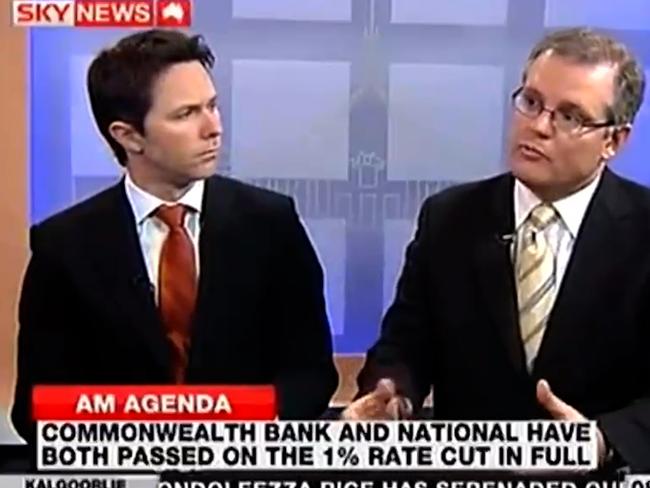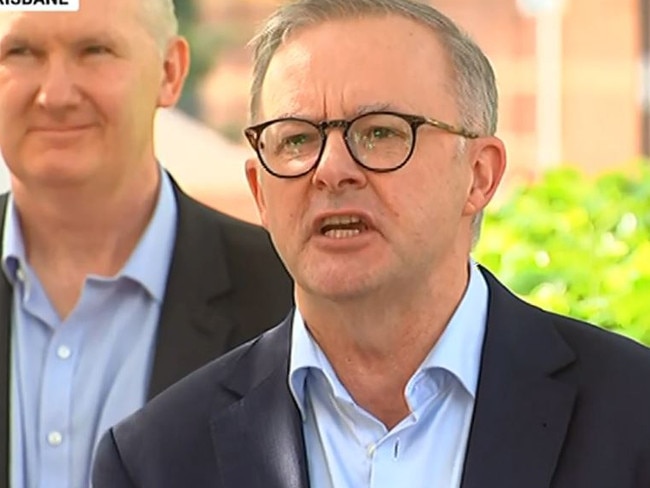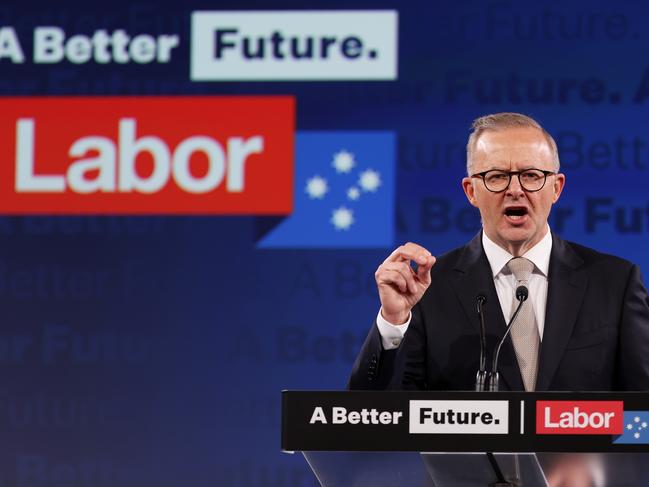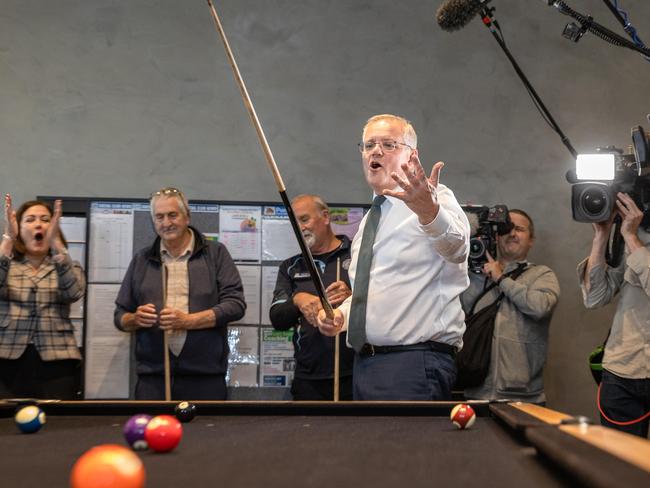PM’s changed stance on shared equity mortgages; Questions answered on Labor’s scheme
Video has emerged revealing how Scott Morrison once backed using government cash to prop up mortgages, as the full impact of Labor’s plan are revealed.
Federal Election
Don't miss out on the headlines from Federal Election. Followed categories will be added to My News.
At the height of the global financial crisis Scott Morrison called on the Labor Government to put half a billion dollars into “shared equity mortgages” to assist homeowners, despite now criticising Anthony Albanese for proposing the same measure to help first-time buyers.
In a Sky News interview in 2008, a young Mr Morrison sits next to Labor frontbencher Jason Clare and argues in favour of using public funds to help Australians in mortgage stress at risk of losing their homes.
“We suggested that the (Labor) government take out of that $8 billion they put aside for residential mortgage backed securities, they take $500 million of that, that is already out there and put that into shared equity mortgages,” Mr Morrison said.
“Because shared equity mortgages are a really good opportunity if you do get into mortgage stress, you can reconsolidate your mortgage, you can go on a situation where the bank take effectively a portion of equity in your property and that way you can reduce your payments.”
Though he previously backed the idea, Mr Morrison has this week criticised Mr Albanese for proposing a similar scheme to help low-income earners buy their first home by using government equity.
Asked about his change in stance from 2008 to now at a press conference in Monday, Mr Morrison argued he had only ever been in favour of private equity, not a public government-funded scheme.
“Shared equity schemes have been around for a long time and some people choose to do them in at the private sector,” Mr Morrison said.

He said during the GFC a “lack of liquidity” in the debt market preventing banks from providing the products customers wanted was a “very different set of issues” to the inability of low- and middle-income earners to raise capital to buy their first home.
“What I was referring to in 2011, I think it was, was in the middle of a global financial crisis when there was a squeeze on credit so I was proffering sensible interventions that would enable the private sector to give people more choices,” he said.
It comes as it emerged homes purchased by low and middle income earners under the Labor scheme will be sold off when the buyer dies, unless proposed beneficiaries meet the program’s strict eligibility criteria.
Owners would also be banned from renting out their home if they need to move, except in certain circumstances.
Major questions were asked on Monday about how the scheme would work and whether it would make homes more expensive, as warned by economists.
Labor Leader Anthony Albanese didn’t directly address questions about whether his policy would push up prices, but said he had a range of policies to help more people own their own home in an environment where the “cost of housing is very high”.
Opposition housing spokesman Jason Clare told News Corp that renovators would get all the benefits of any improvements they make to their home.

Any renovations would be independently assessed to ensure the government doesn’t profit from the improvements, he said, similar to how the scheme in Victoria operates.
He said that owners would be able to pass their home on to beneficiaries to live in when they die, but only if those beneficiaries meet income tests.
“If the beneficiary is a multi-millionaire, then the property gets sold and the government gets its proportion of the home back. The beneficiary of the will gets their proportion of the home paid out,” he said.
Homebuyers under the scheme would need to live in their home, meaning they will not be able to rent it out if they move except in “exceptional circumstances” like if someone is required to move interstate for work.
“On a case-by-case basis, they’ll give you an exemption so that you don’t need to live in the home,” Mr Clare said, referencing the Victorian scheme on which Labor’s plan is based.
The program is expected to cost $329 million to help up to 40,000 low and middle income earners buy a house - with the government taking up to 40 per cent of the equity. This will be made up with the cost of administering the scheme, and paying interest on the stake of homes the government owns.

Mr Albanese on Monday said his “Help to Buy” scheme was modelled on similar state policies, including in Western Australia where that state’s policy had “enabled people to get into housing who wouldn’t otherwise get there”.
A similar policy is being considered by the NSW government in the lead up to its June budget.
“This is a sensible plan,” Mr Albanese said.
The Coalition accused Labor of having “waved the white flag on home ownership”.
“We want Australians to own their own home – Mr Albanese wants Labor to own your home,” Housing Minister Michael Sukkar said.
“Every time somebody sells their home under the scheme they face a 40% housing tax as the Government takes its share.”
Scott Morrison has renewed his attack on Labor’s housing plan, insisting low and middle income earners will be worse off under the policy.
Prime Minister Scott Morrison took another swing at Mr Albanese’s shared equity scheme during a visit to an aged care home.
“Labor has a plan where they want the government to own your home, it’s not only that, you are last in line when it comes to your home. The bank has the first call over it,” he said.
“The government has the second call over it, and you come last when it comes to your own home.”

But asked if he would be personally responsible for an expected interest rate rise on Tuesday, the Prime Minister sensationally accused the media of playing politics.
“You know what, it is not about politics. It is not about politics,” he said.
“What happens tomorrow deals with what people pay on their mortgages. It is not about what it means for politics.
“I mean, sometimes you guys always see things through a totally political lens. I don’t.”
QUESTIONS ON LABOR’S “HELP TO BUY” HOUSING SCHEME
Q: Labor’s policy says it will cost $329 million to hep up to 40,000 people buy homes over four years. What does that money go to?
A: “The $329 million is part admin costs for the scheme and part of the interest that we pay on the money we borrow to invest in the homes,” Opposition Housing spokesman Jason Clare said. “This has been this has been costed by the PBO (Parliamentary Budget Office)”.
Q: Homeowners pay all of the taxes, fees, and admin charges, but the government takes up to 40 per cent equity. Is that fair?
A: The policy is based on other state schemes. “The way this works in WA and in Victoria, is that the homeowner doesn’t pay rent on the 30 per cent of the home the government owns. We’ll apply the same approach here so you’re not forced to pay a cent in rent,” Mr Clare said.
Q: If someone decides to renovate their house and that increases the value of their home, when they then sell it, does the value of the government’s stake increase? How is that calculated?
A: No. Any renovations only benefit the homeowners’ stake. “If you do a major renovation like a new kitchen or you put a pool in, that there’s an independent valuation done to make sure that when the property is sold, you get the full benefit of that investment,” Mr Clare said.
Q: Can someone pass the home onto their children to live in when they pass away?
A: “Only if the beneficiaries meet the eligibility criteria,” Mr Clare said. If they are not eligible, “then the property gets sold and the government gets its proportion of the home back, and the beneficiary of the will gets their proportion of the home paid out.” he said.
Q: If someone needs to move interstate after taking a new job, can they rent the property out?
A: Only in exceptional circumstances, assessed on a case-by-case basis. “One of the rules around the (existing) schemes around the states is that you’ve got to live in the home,” Mr Clare said.
“If you’ve got a situation where you’ve got to move interstate for a period of time, they’ll give you an exemption on a case-by-case basis and our scheme would work in the same way just using a commonsense approach.”
Q: Does the Commonwealth have to pay land tax?
A: No.
Q: If a home is not insured and it gets damaged, would the government be on the hook for repairs?
A: All the homes must be insured. “Under the existing screens the home has to be insured against damage and destruction and any other risk that’s required,” Mr Clare said.
Got a story tip? Email us at federalelection@news.com.au
Know some goss or seen something in your electorate? Contact us at election.confidential@news.com.au




